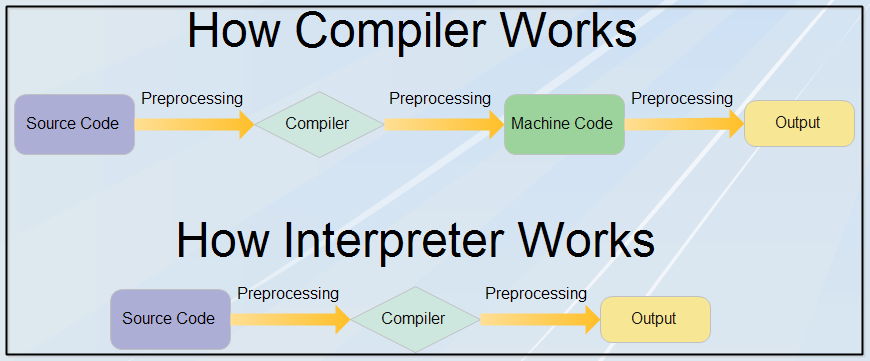Compilers and interpreters are translator programs (also called language processors) for converting high-level language into machine codes for the computer. Computer programs are usually written in languages of high-level. People can understand a high-level language. To clarify this, they contain words and phrases from commonly used languages such as English or other languages. Computers, however, cannot understand high-level languages like we humans.
The computer can understand only the programs developed in binary systems known as the machine code. First, a computer program is usually written as a source code in the high-level language. These source codes must be converted to a machine language, and the compilers and interpreters have a role to play. The compiler translates the source code to Machine code and Binary code.

We’ll be covering the following topics in this tutorial:
Differences between Interpreter and Compiler
| Interpreter | Compiler |
| Only one statement of the program is translated into machine code by the interpreter. | Compiler scans the entire program and simultaneously translates it into a machine code. |
| The interpreter checks the keywords of the program. | The compiler checks the program syntax. |
| It takes less time to analyzing and processing the source code. The time to execute the process is, however, much slower. | It takes a long time to analyzing and processing the source code. The overall time required to complete the process is, however, much faster. |
| An intermediary code is not generated by an interpreter. An interpreter is therefore highly efficient in memory. | An intermediate object code is always generated by a compiler. It will need to be linked further. More memory is therefore required. |
| Continuously translates the program until the first error is encountered. If an error is detected, it stops working and therefore debugging is easy. | A compiler generates the error message only after scanning the entire program and therefore debugging while working with a compiler becomes relatively difficult. |
| Interpreters are used in programming languages such as Ruby and Python. | Compilers are used in programming languages such as C and C++. |
How Interpreter and Compiler work?
The compiler is a translator program that translate source code into the executable program from a high-level programming language to a lower-level language (e.g., assembly language, object code, or machine code).
The Parser (also known as Lexical Analyzer), a part of a compiler responsible for, recognizes all the language’s syntax, but it is slow for debugging. Lexical Analyzer (First phase of Compiler) is also called “Linear Phase” or “Linear Analysis” or “Scanning”.
In a compiler, the code generator module checks every character of the source text. It can check Syntax errors. It is the process of analyzing a string of symbols and conforming to the rules of grammar. If something is wrong, it will produces object code and an error message. The Compiler can diagnose grammatical errors only. If no errors are detected, the compiler converts the source code into machine code. The compiler links the various code files to programs such as exe. The program finally runs.
An interpreter is a program that can “directly run high-level programs (Source Code) without first being translated into machine language. Similarly, Assembler is used in the case of low-level languages. It does not link the files and does not generate machine code.
The source statements are performed line by line during program execution. Each source statement is analyzed by the interpreter each time it is executed. An interpreter is preferred over a compiler during the program development phase.
Advantages and disadvantages of Interpreter and Compiler
If compilers are used, program codes are already translated into machine code, and the time to execute them is therefore much less. On the negative side, you can not change the program when working with a compiler without going back to the source code.
Interpreters make it much easier to work with the source code. Therefore they are particularly suitable for beginners. On the negative side, only the computers with the respective interpreters can be used for interpreted programs.
 Dinesh Thakur holds an B.C.A, MCDBA, MCSD certifications. Dinesh authors the hugely popular
Dinesh Thakur holds an B.C.A, MCDBA, MCSD certifications. Dinesh authors the hugely popular